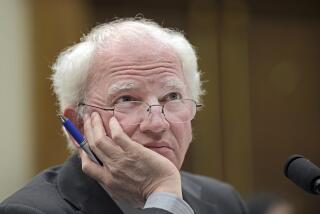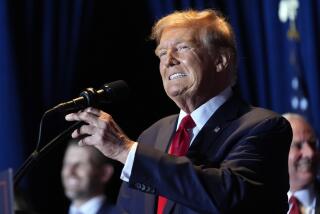Lobbyist who wrote book about Justice Scalia might need his help
WASHINGTON — Nine years ago, Kevin Ring was a young rising star in conservative legal circles here when he published his first book, “Scalia Dissents,” a tribute to Antonin Scalia as the Supreme Court’s “wittiest, most outspoken justice.”
This week, the former lawyer and lobbyist may well need an assist from the outspoken Scalia if he is to avoid going to federal prison for nearly two years.
Ring’s last-chance appeal comes before the Supreme Court justices as they meet Monday for an annual fall ritual. They will sift through 2,000 appeal petitions that arrived during the summer to select about a dozen cases that will get a full hearing and a decision.
This year’s list includes many appeals from corporations and business groups fighting big lawsuits or challenging the Obama administration’s environmental regulations. Others come from police agencies contesting lawsuits against officers or from states fighting constitutional challenges to their laws. But the majority come from prisoners and criminal defendants like Ring, for whom the high court represents their last hope. Most will be turned down without a moment’s debate by the justices.
Ring’s appeal, however, has at least a chance of getting the court’s attention because it turns on the meaning of the law. As the judges who upheld his conviction acknowledged, it rests on the “subtle” distinction “between legal lobbying and criminal conduct.”
Three years ago, prompted by Scalia’s dissents, the high court limited the reach of the law against “honest services fraud.” Scalia had argued that the law was so hazy that no one could be sure what was a crime. In one memorable example, he said in 2009 that the law seemed so broad that an employee skipping work to go to a Chicago Cubs game in the afternoon could be charged with a federal crime for defrauding his employer.
In a 6-3 opinion in another case in 2010, the court narrowed the law to cover only bribes and kickbacks. Scalia wanted to go further and throw out the law completely.
By coincidence, the first person tried and convicted under the revised version of the honest services fraud law was Kevin Ring. He had worked on Capitol Hill as a staff lawyer for Republicans in the House and Senate, including then-Sen. John Ashcroft of Missouri, and at age 29 left to join the high-powered Washington lobbying firm led by Jack Abramoff. In 2004, a federal investigation exposed a kickback scheme masterminded by Abramoff that bilked Indian tribes of millions of dollars.
A broader investigation of “team Abramoff” revealed that lobbyists had paid for golf junkets, expensive meals and tickets to luxury skyboxes at sports events for members of Congress and their staffs.
Abramoff pleaded guilty in 2006 and served four years in prison. In 2007, Congress passed a new law to prohibit members and staffers from taking gifts from lobbyists.
Ring cooperated with investigators at first but refused to testify that he had bribed friendly congressional staffers with meals and sports tickets. In 2008, prosecutors charged him with multiple counts of corruption.
Ring was the only Abramoff lobbyist to go to trial, and after two tries, a jury convicted him of honest services fraud on the theory that the gifts and tickets were bribes. None of the congressional staffers were charged for their dealings with Ring.
Prosecutors sought a sentence of 22 years for Ring, who is separated from his wife and is raising their two young daughters. The judge decided on a 20-month sentence and allowed Ring to stay at home while he appealed.
His attorney, Timothy O’Toole, questioned whether a crime took place. “At the time, this was widespread. You had all sorts of lobbyists doing exactly the same thing, and the law had no clear line between what is legal and illegal,” he said.
In January, however, the U.S. Court of Appeals here upheld his conviction and said a bribery charge did not require proof of a corrupt deal to take an action in exchange for a gift. All that was required was proof the lobbyist intended to influence an official to do something, the judges said.
“The line between legal lobbying and criminal conduct is crossed,” said Judge David Tatel, “when a gift is intended as a reward for a specific past or future official act.”
Tatel cited an example in which Ring gave two Washington Wizards tickets to a Justice Department attorney after the attorney forwarded an email to another official asking that he look into a pending visa application from a foreign student.
Ring’s attorney asked the high court to review his case and clarify the meaning of bribery. Ring has said he does not know Scalia and had no personal contact with the justice when he wrote his book.
The justices will vote Monday on the appeals that drew their attention and announce Tuesday which they will hear. A few will be held over for further discussion; the rest will appear as “denied” on a long list to be issued Oct. 7.
More to Read
Start your day right
Sign up for Essential California for news, features and recommendations from the L.A. Times and beyond in your inbox six days a week.
You may occasionally receive promotional content from the Los Angeles Times.







